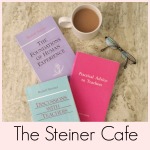It is 9:00 am on August 22, 1919, day two of the lectures to prepare the teachers in the very first Waldorf School. Picture a group of a dozen adults, only one of whom had every taught in a classroom before, gathered in a Stuttgart cafe which Emil Molt of the cigarette factory had purchased to turn into the school.
Rudolf Steiner begins by acknowledging that “instruction must be generally based upon psychology” but he feels that the psychology of the time has become a series of clichés, devoid of an understanding of the human soul and its relationship to the cosmos. He presents a new psychology developed from an anthroposophical (spiritual scientific) understanding of the world.
This lecture focuses specifically on the importance and distinction between thinking, feeling and willing: “we must certainly develop thinking, feeling and willing in the children. Thus, we must first develop a clear concept of what thinking is.” Steiner is himself a deep thinker, and he believes that thinking can be a spiritual activity.
The curriculum for the children, on the other hand, is very experiential and hands-on. And as I read these lectures (Jean speaking), it is becoming more and more clear to me that Steiner felt a deep need to combat teaching that is abstract.
Alison’s humorous observation of this lecture: There are lots of complicated concepts and thoughts here – the main purpose of which is to implore us NOT to be abstract in our teaching!!! I think it’s funny. 🙂
Steiner believes that thoughts come from the spirit world before birth and are pictorial in nature. “Thinking is a picturing of all our experiences before birth or before conception.” The will is spiritual in nature as well and is “the seed within us of what our spirit-soul reality will become after death.”
Accompanying this lecture, Steiner drew a diagram of thinking – the thought/picture – before birth…then moving toward death – as the will/seed. He puts all of this out there so that we can free ourselves of the definitions of thinking found in works of psychology and pedagogy in his time.
WOW. Steiner then goes on to describe how our feelings transform thinking and willing: antipathy transforms our soul life into a life of ideas; sympathy transforms our soul life into deeds. We create the soul life as a rhythm between sympathy and antipathy.
Jean: I could reflect on these ideas for days and still feel a little lost in my thoughts! It’s not that I disagree. This is simply a very different way to define these terms! So how does this apply to teaching and learning?
Steiner believed that education can serve to connect the human being to the cosmos rather than the decadent material world if brought in this alive way. If we bring concepts and abstractions too soon, that deadens one’s soul instead of bringing out the soul’s best qualities and sowing the seeds of future noble action and thought within the child.
Alison’s Summary: We want to sow the seed with pictures, water the seed with bodily action and artistic activity, and it will take root and blossom into something beautiful. We can bring this living pictorial quality to our lessons in MANY ways in our homeschools – very individual ways. A great blessing of the homeschool is that we have the time and luxury to tailor this to our own families and children.
Jean: I am embracing my visual nature! And I have a new appreciation for movement and artistic activity as a way to combat the abstract, to bring our thinking and learning alive.
How do you combat the abstract?
The Steiner Cafe is a place to explore and reflect on the lectures that Rudolf Steiner gave at the Teacher’s Seminar in 1919, the very first Waldorf teacher training. Each month here, we ponder one day of the seminar.
To read reflections on previous lectures, check out The Steiner Cafe page.
These lectures are published in three books; the morning lectures in The Foundations of Human Experience; later morning lectures in Practical Advice to Teachers; afternoon lectures in Discussions with Teachers. We invite you to pick up the books and read along.
If you prefer, you can read online at www.rsarchive.org, or listen at www.rudolfsteineraudio.com. Or, just meet us here each Thursday or Friday at The Steiner Cafe for some lively discussion. Lot’s of options! Hope you’ll join us.



Very nice summaries! I like the question at the end: how do you combat the abstract? It is all around us, on all those little devices with screens!
Yes, I’m finding this concept of combating the abstract more and more relevant. What a difference even in the last 10 years I’ve been homeschooling. Abstraction seems to be everyone! So, we just keep coming back to engagement – what are ways we can engage with the world, with our learning, with each other?
I am loving following these small discussions after every lecture. Thank you so much for taking the time to put this together. This is my first attempt at diving into Steiner’s works; I have always been a little daunted. But reading your overviews at the end of each lecture is helping me to see how I can implement these philosophies at home in a practical way.
Thanks, Misha! So happy to hear that. I find it so fascinating to read Steiner’s advice to the first teachers and then consider how to apply that to homeschooling. Glad others find that helpful too! 🙂